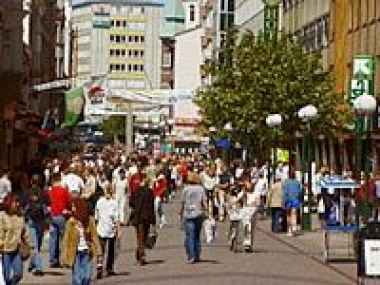URBACT NDP Sweden - Peer Review, a participatory instrument of evaluating urban development
Edited on
21 June 2019What is the method of Peer review ? How is it working and for which results in terms of urban development? The Swedish URBACT National Dissemination Point emphasizes the usefulness of this learning process focussing in particular on the success of the URBACT CoNet project in using the Peer Review method.

The method of Peer Review has been used for a long time in the academic world as a tool to review scientific publications, but has been more widely in social science used during recent years. During the Lisbon summit in 2000, the method was promoted by the European Commission as part of the Open Method of Coordination. The method could be described as a learning process with the involvement of equals, reviewing examples of good practice on the basis of systematic exchange.
When talking about urban development, the advantages of the Peer Review method were recently proven in Sweden. The method has been used on city level in the EU-project Connections, a mutual learning project with a primary focus on the way the integrated response to tackling multiple deprivation is organised in European cities. In the Connections project, researcher Dr Mikael Stigendal from Malmö University was involved and introduced to the method. In June 2009, Mikael Stigendal, as a Thematic Expert for the URBACT Programme, applied the method of Peer Review to the URBACT project CoNet. Two different examples of social sustainable urban development in Malmö, "The Little Green House", a meeting place for young people and "Young in Research", a project where young people are introduced to research as a summer job, were reviewed by delegates from a number of cities in Europe during the CoNet conference in Malmö. The two examples are local projects initiated through a larger umbrella project funded by the ERDF, called SÖM Fosie, which aims at active inclusion in one of Malmö's most disadvantaged city district, the City District of Fosie. The purpose of SÖM Fosie is to "mainly promote an increase of gainful employment and a decrease in the dependency on social allowance; create attractive and safe neighbourhoods, an increase of growth and democracy and partaking", according to the project description.
The peers reviewers (delegates from the cities participating in CoNet) was handed a "![]() Download Pre-review_reports_1_.pdf (166.74 KB)" a couple of weeks before the visit, in order to get acquainted with the projects and to be prepared for the site visits. The report included a number of questions which the authors wanted the visiting peer reviewers to answer. These questions related to a number of success criteria, originating from the URBACT I project "
Download Pre-review_reports_1_.pdf (166.74 KB)" a couple of weeks before the visit, in order to get acquainted with the projects and to be prepared for the site visits. The report included a number of questions which the authors wanted the visiting peer reviewers to answer. These questions related to a number of success criteria, originating from the URBACT I project "![]() Download Operational_Guidelines_-_Young_People.pdf (826.62 KB)" (2004-2006). The criteria; Empowerment, Strengthened social relations, Structural changes of schools, Co-operation with local society and Renewing the view on knowledge, were used as benchmarks in order for the peer reviewers to make an assessment of the success of the two examples.
Download Operational_Guidelines_-_Young_People.pdf (826.62 KB)" (2004-2006). The criteria; Empowerment, Strengthened social relations, Structural changes of schools, Co-operation with local society and Renewing the view on knowledge, were used as benchmarks in order for the peer reviewers to make an assessment of the success of the two examples.
When in Malmö, the peer reviewers visited the two examples for a couple of hours, looked around, listened to presentations by the project participants and asked them questions. The day after the site visits, the peer reviewers made a presentation, giving their reviews about the examples according to the predefined set of questions. The result of the peer reviewers' presentations was put into a ![]() Download Post-review_report_-_090901_1_.pdf (86.66 KB), written by the researcher Mikael Stigendal. The results from the Peer Review were used not only to review the success of the two examples, but also to suggest areas of improvement.
Download Post-review_report_-_090901_1_.pdf (86.66 KB), written by the researcher Mikael Stigendal. The results from the Peer Review were used not only to review the success of the two examples, but also to suggest areas of improvement.
The method has since the CoNet conference in Malmö gained larger attention and was the matter of a seminar at Malmö University in March 2010. The success from the CoNet and the Connections projects has paved the way of using Peer Review as a method of evaluation in several new initiatives in the City of Malmö, aiming at urban development.
Read more:
- CoNet – URBACT
 Download Pre-review_reports_1_.pdf (166.74 KB) - PDF
Download Pre-review_reports_1_.pdf (166.74 KB) - PDF Download Post-review_report_-_090901_1_.pdf (86.66 KB) - PDF
Download Post-review_report_-_090901_1_.pdf (86.66 KB) - PDF Download Thematic_report_-_090901_1_.pdf (96.93 KB) - PDF
Download Thematic_report_-_090901_1_.pdf (96.93 KB) - PDF- Connections project – website
- Researcher Mikael Stigendal's - website
Submitted by admin on
